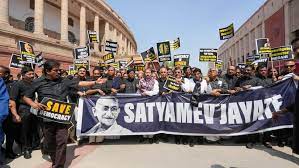In a riveting turn of political events that could reshape the national landscape ahead of the 2024 Lok Sabha elections, a conglomerate of 17 opposition parties convened in Patna last Friday, aiming to present a united front against the ruling Bharatiya Janata Party (BJP). However, the alliance has been met with significant criticism from both the BJP and the Telangana minister K T Rama Rao, who painted a disparaging portrait of the national parties.
Union Minister and BJP leader, Smriti Irani, launched a blistering attack against the newfound alliance during a press conference in Patna. She dismissed the coalition as a “multi-headed selfish alliance,” likening it to a pack of wolves targeting not just Prime Minister Narendra Modi, but the nation’s prosperity. “Their ‘prey’ is the future of India,” Irani commented, indicating that the alliance’s formation is aimed at India’s national coffers, not a targeted political manoeuvre.
Irani drew on history as a cautionary tale, arguing that when these political parties previously allied, they ushered in corruption and nepotism, casting a shadow over the nation’s economic progress. The Union Minister also alluded to the Aam Aadmi Party’s (AAP) actions, characterising them as “blackmailing,” indicative of the unholy and potentially destructive nature of the alliance. The BJP leader also referred to the surprising camaraderie between West Bengal Chief Minister Mamata Banerjee of the Trinamool Congress Party (TMC) and the Communist Party, known for their past confrontations. Irani posited that TMC members would never have anticipated such an alliance, given the Communist Party’s historical mistreatment of Banerjee, including public humiliation.
Irony was not lost on Irani, who cited historical tensions between other coalition members. She pointed out how members of the Congress party in West Bengal would not have expected a union with Banerjee, whose past is marred with the blood of Congress workers. Similarly, the Indian National Congress’s alliance with Dravida Munnetra Kazhagam (DMK), implicated in the assassination of Rajiv Gandhi, seemed unfathomable to many in Tamil Nadu. These alliances beg the question, she proposed, “At what cost will the Gandhi family do its politics?”
The BJP’s response to the Opposition’s meeting was not the only critique of the alliance. Telangana Minister and Bharat Rashtra Samithi (BRS) leader, K T Rama Rao, in his discussion with reporters, expressed his scepticism about the efficacy of a united front built around the Congress or the BJP, stating, “These two national parties have been a huge disaster for the nation.”
Rama Rao asserted that the country’s priority should be uniting its people, rather than political parties, citing the historical failures of past coalitions. In his view, a people-centric approach is paramount, a stance long-held by his party, the BRS. This policy draws a sharp contrast to the traditional system where either BJP or Congress act as the fulcrum of any coalition, a practice that Rao and BRS sternly oppose.
The minister did not hold back his criticism of the two parties’ governance, arguing that despite their cumulative 65-year reign, significant developmental issues like high inflation, water and electricity scarcity persist. To rectify these woes, Rao advocates for a third front that excludes the Congress or BJP. He added that his party, led by K Chandrashekar Rao, is independently expanding its influence beyond Telangana.
In response to allegations of BRS being a ‘B-team of BJP,’ Rao rebuffed such claims, terming them as signs of “intellectual and political bankruptcy.” He held the Congress responsible for numerous national issues, stating that their five-decade rule was a disaster for the nation.
These remarks, while highlighting significant concerns with the country’s dominant political parties, paint a vivid picture of India’s shifting political landscape. With alliances forming, old rivalries mending, and dissenting voices rising, the road to the 2024 Lok Sabha elections promises to be an enthralling journey. As the Opposition consolidates its forces to challenge the ruling BJP, the question of who will prevail remains. Will the “pack of wolves” succeed, or will the solitary voices prove triumphant?

















